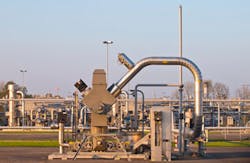Methane-capturing equipment at drilling sites cuts emissions by 97%
The U.S. oil and gas industry has made significant progress in reducing the amounts of methane leaking from natural gas wells into the atmosphere, a new study, published in the Proceedings of the National Academy of Science, has revealed.
A team of researchers examined 190 drilling sites and concluded that methane-capturing equipment, used on fracking sites, has reduced methane releases by 97 percent compared with 2011 levels, based on estimates from the U.S. Environmental Protection Agency (EPA).
However, the researchers at the University of Texas at Austin's Cockrell School of Engineering also warned drilling companies that methane leaks from valve controllers and other equipment are larger than previously thought.
RELATED: Explosion at West Virginia natural gas well injures five workers
The UT-led study, which also involved effort from experts from the Environmental Defense Fund and various other industry players, showed that up to 40 percent of the total methane emissions from natural gas production are released by various types of pneumatic devices, such as compressors. This is at least one-third higher than the amounts previously estimated, which supports the conclusion that the overall methane output associated with hydraulic fracturing is "comparable" with the estimates of the EPA.
David Allen, principal investigator for the study, commented that the research is the first ever direct measurement of methane emissions from natural gas wells and the results show that the way in which drilling works have been developing is effective for reducing emissions.
